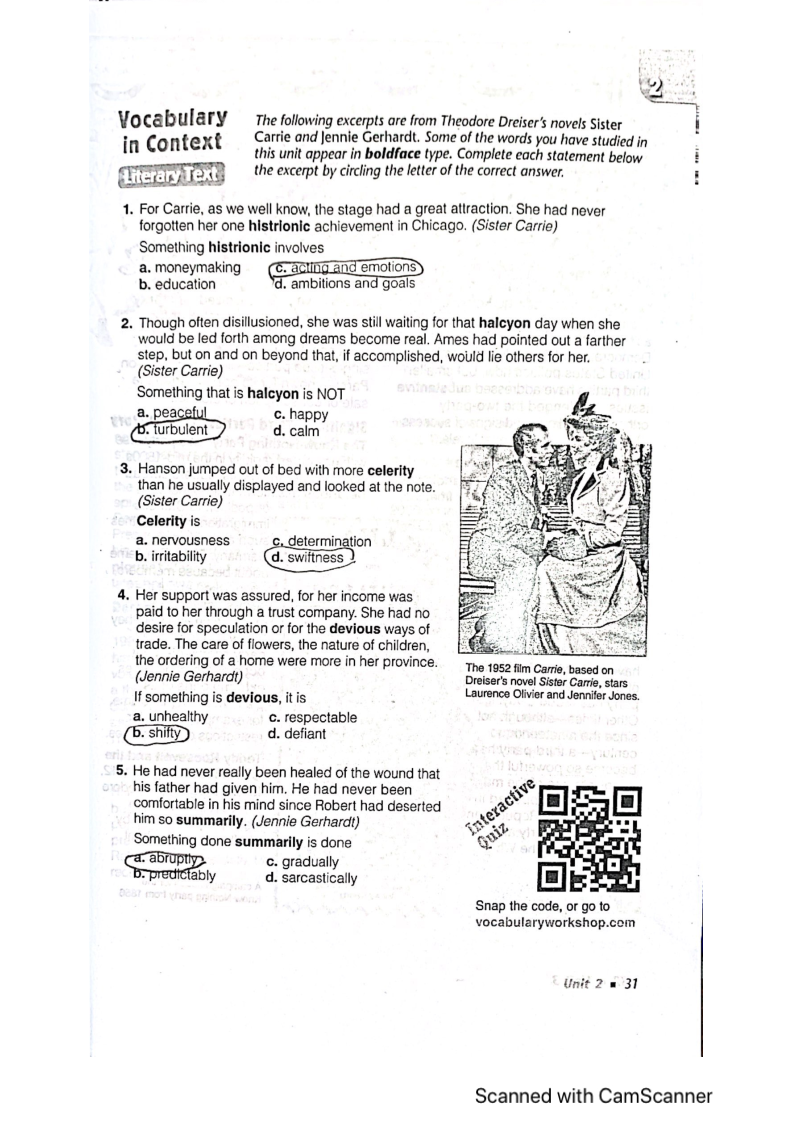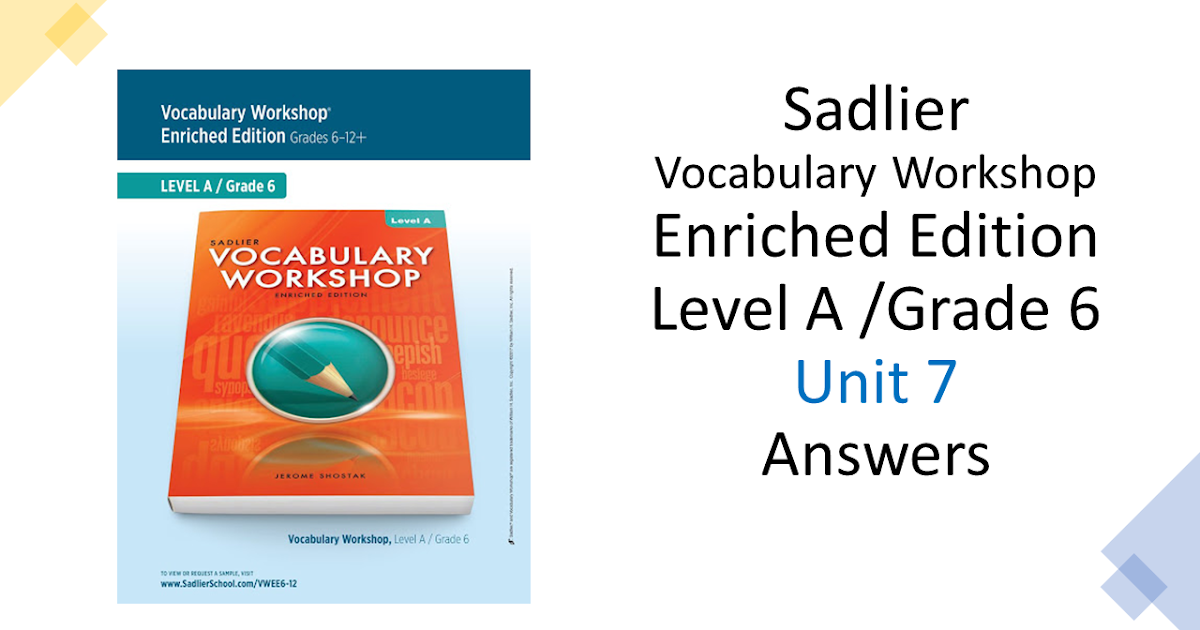Remember that sinking feeling when you encountered a vocabulary word you didn’t understand? The struggle to decipher its meaning, the frustration of being unable to grasp the nuance of the text you were reading – it’s a feeling many students (and adults) have experienced. But fear not! Unit 7 of Vocabulary Workshop Level C, known for its challenging vocabulary, is not an insurmountable hurdle. With the right approach and resources, you can conquer these advanced words and expand your linguistic prowess.

Image: kemarstavya.blogspot.com
We’ll delve into the challenges of Unit 7, exploring the tricks and techniques to overcome them. We’ll dissect the vocabulary words, analyze their usage, and uncover the secrets to mastering them. This guide will equip you with the knowledge and confidence to tackle Unit 7 head-on, turning those intimidating words into stepping stones to fluency and academic excellence.
Understanding the Challenges of Unit 7
Unit 7 of Vocabulary Workshop Level C is notoriously challenging for several reasons. The words introduced are often complex, drawing from a wider range of academic disciplines and literary genres. Their meanings might be nuanced, requiring a deep understanding of their historical and cultural contexts. Additionally, the exercises in the workbook push you to apply these words in a variety of contexts, requiring a flexible and adaptable approach.
This unit is not about memorizing definitions in isolation. Instead, it seeks to foster a deeper understanding of how these words function in language, how they are used to convey specific meanings, and how they enrich our communication and comprehension. While the initial hurdle might seem daunting, with consistent effort and a strategic approach, you can turn this challenge into an opportunity for significant vocabulary growth.
Decoding the Vocabulary Words
One of the most effective ways to tackle Unit 7 is to break down the vocabulary words into manageable chunks. Pay attention to their roots, prefixes, and suffixes, as these elements often reveal clues about the word’s meaning. For instance, understanding the prefix “pre-” as indicating “before” can help you decipher the meaning of “premonition” as “a feeling that something will happen.” Similarly, knowing the suffix “-ology” signifies “study of” can clarify the meaning of “biology” as the “study of life.” By dissecting the components, you gain a deeper, more nuanced understanding of the word, making it less intimidating and easier to recall.
Utilizing Context Clues
Context is your best friend when tackling vocabulary words. While memorizing definitions is helpful, truly comprehending a word requires understanding its usage in different contexts. As you encounter a new word, pay attention to the surrounding phrases and sentences. These context clues can help you infer the word’s meaning, even if you’re not familiar with it. Notice how the word relates to the other words in the sentence, the tone and style of writing, and the overall theme of the passage. By analyzing the context, you can gain a more intuitive understanding of the word’s meaning and its nuances.

Image: www.elafree.com
Beyond Definitions: Exploring Etymology
Exploring the etymology of a word, its origin and historical development, can provide a deeper understanding of its meaning and usage. Tracing a word’s journey from its earliest form to its current usage can reveal subtle shifts in meaning and reveal its cultural and linguistic significance. For example, the word “pandemic” originates from the Greek words “pan” (all) and “demos” (people). Understanding this etymology clarifies the word’s meaning as “prevalent over a whole country or the world.” By delving into the origins of words, you gain a more comprehensive grasp of their meaning and their place within the wider vocabulary landscape.
Engaging in Active Learning Strategies
Active learning strategies go beyond passive reading and memorization. Engage with the vocabulary words through active exercises, such as writing sentences using the words, creating flashcards with definitions and examples, and participating in discussions about the words. By actively manipulating the words and incorporating them into your own vocabulary, you solidify your understanding and make them more readily available for use.
Creating a Personalized Approach
There is no one-size-fits-all approach to mastering vocabulary. Each individual has their own learning style and preferences. Experiment with different learning techniques and strategies to identify what works best for you. Some individuals may benefit from visual aids, such as diagrams, while others may prefer creating mnemonic devices to remember difficult words. By tailoring your learning approach to your individual needs, you make the process more enjoyable and effective, maximizing your vocabulary growth.
Beyond the Book: Integrating Vocabulary into Everyday Life
Don’t limit your vocabulary development to the pages of the workbook. Actively seek out opportunities to encounter these words in your everyday life. Pay attention to vocabulary used in news articles, documentaries, and books. You can also use vocabulary apps and websites to expand your word knowledge. Integrating your vocabulary learning into your daily routines makes the process more natural and ensures that the words become part of your everyday lexicon.
Tips and Expert Advice
Here are some tips and expert advice to enhance your vocabulary journey:
- Focus on the roots and affixes: Understanding the core components of words will unlock their meaning and make them easier to remember.
- Utilize context clues: Pay attention to the surrounding text to infer meaning, even if you don’t know the word’s definition.
- Embrace etymology: Tracing the origins of words can provide a deeper understanding of their meaning and nuances.
- Engage in active learning: Write sentences, create flashcards, and discuss the words to solidify your comprehension.
- Personalize your approach: Experiment with different learning strategies to find what works best for you.
- Integrate your learning: Seek out opportunities to encounter vocabulary words in your daily life.
Remember, vocabulary development is an ongoing process, not a destination. Don’t be intimidated by challenging vocabulary words. Embrace the opportunity to expand your linguistic horizons, and soon you’ll find yourself effortlessly navigating complex texts and expressing yourself with greater confidence and clarity.
FAQ
Q1: What are the most common mistakes students make when tackling Unit 7 of Vocabulary Workshop Level C?
A: Many students rely solely on memorizing definitions without fully understanding the words’ nuances and usage. They also might be intimidated by the complexity of the words and avoid engaging with them actively, leading to a weak grasp of the concepts.
Q2: How can I make studying vocabulary less tedious?
A: Incorporate fun elements into your learning. Create games with vocabulary flashcards, write stories using the words, or watch educational videos related to the themes explored in the unit.
Q3: What are the benefits of learning advanced vocabulary?
A: Expanded vocabulary enhances your reading comprehension, writing, and communication skills. It allows you to express yourself with greater nuance and clarity, making you a more confident and articulate speaker and writer.
Unit 7 Vocabulary Workshop Level C Answers
Conclusion
Mastering Unit 7 of Vocabulary Workshop Level C can be a significant step in your linguistic journey. By using effective learning strategies, engaging with the words actively, and seeking opportunities to encounter them in everyday life, you can build a strong foundation for advanced vocabulary and unlock the power of language to enrich your communication and understanding. So, are you ready to take on this challenge and expand your vocabulary horizons?






